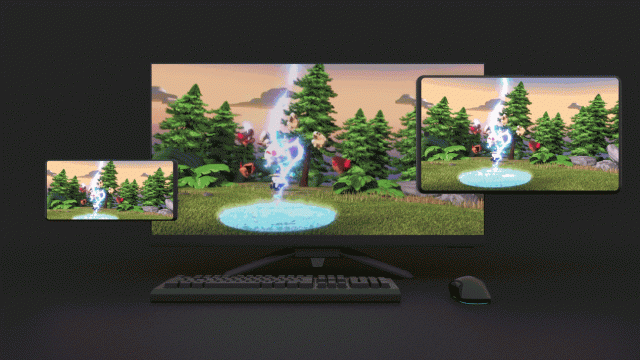Are you growing tired of staring at your 5 by 2 inch screen to play Android mobile games? Well, on Tuesday, Google’s Android Developers blog announced that the company’s launching a new beta for a platform that will let users play their Android games on PC.
The company had already launched its beta for the Google Play Games launcher back in January, though it restricted the product to some Asian markets such as Korea, Hong Kong, Taiwan, and Thailand. Oh, and also Australia. Now the developers are opening it up to players in western markets, including the U.S., Canada, Mexico, and Brazil, as well as the Philippines, Indonesia, Malaysia, and Singapore. People can sign up for the beta here.
The 85 games on the beta Google Play Games platform include 1945 Air Force, Cookie Run: Kingdom, and Evony: The King’s Return. In the release, the company said the minimum specs required are a PC running Windows 10 or 11, an integrated graphics card and a 4+ core CPU. On the Google Play Games page however, the company claims users need a solid state drive with 10GB of available storage space, 8GB of RAM and an Intel UHD Graphics 630 GPU or comparable. The ram and solid state requirements are surprising, especially considering how many non-desktop gamers might be running much older computers or laptops that do not have access to even those relatively minimal standards. HDD users are out of luck, though maybe the requirement for an SSD is to make sure PCs running these games will have more parity with phones.
The platform itself appears to be akin to many other game launchers, such as the Epic Games Store or GOG Galaxy. Users can browse games, purchase them, and install them onto the desktop. The games should be compatible with keyboard and mouse.
“Our broader goal continues to be meeting players where they are and giving them access to their games on as many devices as possible,” Google Play Games Director Arjun Dayal wrote in the blog post. He further wrote the main hope is that players will be able to sync progress between devices.
As little attention it gets in the broader gaming scene, the mobile gaming market remains one of the biggest motivators for major companies, and lately it’s become a bigger part of many major tech companies’ market strategy. Microsoft recently told the UK in a regulatory filing that it wants to create its own Xbox mobile gaming app, thanks in part to its pending $US68.7 ($95) billion acquisition of Activision Blizzard. The company revealed that it sees mobile gaming as by far the biggest driver of gaming revenue, more than both PC and console sales combined.
Microsoft, for its part, is also separately working to bring Android games to PC, specifically Windows 11, thanks to a partnership with Amazon to list the apps on the Amazon Appstore. Microsoft has been constantly updating its page describing the Windows Subsystem that makes these Android apps compatible with Windows 11. The feature is still in a kind of beta, though Microsoft has been labelling it a kind of “preview.” Gizmodo has its own guide for those curious enough to try and put Android apps on their PCs.
So, as much as Google’s initiative may be trying to catch up to Microsoft’s own, rather subdued efforts to bring Android games to other devices, the company may be trying to make up for its own, recently deceased Google Stadia. In September, the company announced it was killing off its game streaming platform, saying it just didn’t gain enough “traction.”
Not to mention, more and more companies are coming out with devices that claim they’ll let you play your mobile games in a much more comfortable way than clamping down to your thin rectangle while huddled on a cramped subway. Logitech has its own Steam Deck-like platform promising Android game support, and Verizon and Razer have a similar kind of device in the works.
